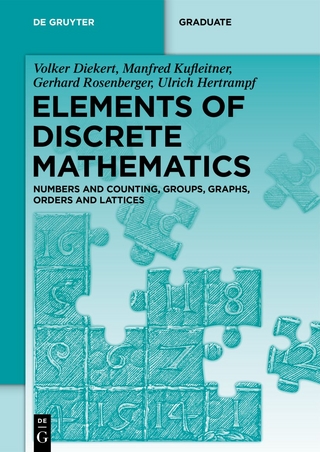
Introduction to Combinatorics
Seiten
1997
Chapman & Hall/CRC (Verlag)
978-0-412-35370-3 (ISBN)
Chapman & Hall/CRC (Verlag)
978-0-412-35370-3 (ISBN)
- Titel erscheint in neuer Auflage
- Artikel merken
Zu diesem Artikel existiert eine Nachauflage
Introduces basic ideas of combinatorics by concentrating on counting problems. The topics covered include combinations, permutations, the inclusion-exclusion principle, partitions, Stirling's formula, generating functions, recurrence relations, group actions and graphs. Exercises are provided.
The growth in digital devices, which require discrete formulation of problems, has revitalized the role of combinatorics, making it indispensable to computer science. Furthermore, the challenges of new technologies have led to its use in industrial processes, communications systems, electrical networks, organic chemical identification, coding theory, economics, and more. With a unique approach, Introduction to Combinatorics builds a foundation for problem-solving in any of these fields.
Although combinatorics deals with finite collections of discrete objects, and as such differs from continuous mathematics, the two areas do interact. The author, therefore, does not hesitate to use methods drawn from continuous mathematics, and in fact shows readers the relevance of abstract, pure mathematics to real-world problems. The author has structured his chapters around concrete problems, and as he illustrates the solutions, the underlying theory emerges. His focus is on counting problems, beginning with the very straightforward and ending with the complicated problem of counting the number of different graphs with a given number of vertices.
Its clear, accessible style and detailed solutions to many of the exercises, from routine to challenging, provided at the end of the book make Introduction to Combinatorics ideal for self-study as well as for structured coursework.
The growth in digital devices, which require discrete formulation of problems, has revitalized the role of combinatorics, making it indispensable to computer science. Furthermore, the challenges of new technologies have led to its use in industrial processes, communications systems, electrical networks, organic chemical identification, coding theory, economics, and more. With a unique approach, Introduction to Combinatorics builds a foundation for problem-solving in any of these fields.
Although combinatorics deals with finite collections of discrete objects, and as such differs from continuous mathematics, the two areas do interact. The author, therefore, does not hesitate to use methods drawn from continuous mathematics, and in fact shows readers the relevance of abstract, pure mathematics to real-world problems. The author has structured his chapters around concrete problems, and as he illustrates the solutions, the underlying theory emerges. His focus is on counting problems, beginning with the very straightforward and ending with the complicated problem of counting the number of different graphs with a given number of vertices.
Its clear, accessible style and detailed solutions to many of the exercises, from routine to challenging, provided at the end of the book make Introduction to Combinatorics ideal for self-study as well as for structured coursework.
Introduction
Permutations and Combinations
The Inclusion-Exclusion Principle
Partitions
Stirling's Approximation
Partitions and Generating Functions
Generating Functions and Recurrence Relations
Permutations and Groups
Group Actions
Graphs
Counting Patterns
Polya's Theorem
Solutions to the Exercises
Suggestions for Further Reading
List of Symbols
Index
| Erscheint lt. Verlag | 1.2.1997 |
|---|---|
| Sprache | englisch |
| Maße | 156 x 234 mm |
| Gewicht | 408 g |
| Themenwelt | Mathematik / Informatik ► Mathematik ► Graphentheorie |
| ISBN-10 | 0-412-35370-9 / 0412353709 |
| ISBN-13 | 978-0-412-35370-3 / 9780412353703 |
| Zustand | Neuware |
| Haben Sie eine Frage zum Produkt? |
Mehr entdecken
aus dem Bereich
aus dem Bereich
Numbers and Counting, Groups, Graphs, Orders and Lattices
Buch | Softcover (2023)
De Gruyter (Verlag)
64,95 €

